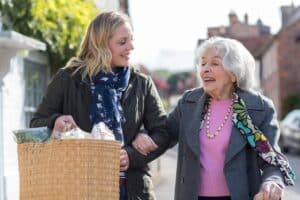
As seniors increasingly age in place, many do so without nearby family to regularly check in. Whether you're a concerned relative, a caregiver, or a community professional, you may find yourself asking, what’s the best way to ask neighbors to check on seniors?
The conversation may not be easy to start, but when approached with respect and clarity, it strengthens community ties and supports aging adults in meaningful ways.
Choose the Right Neighbor
Start by identifying someone who already has a positive connection to the senior or is known for being attentive. The ideal person is friendly, observant, and either lives nearby or has a flexible schedule. Avoid asking someone who seems overcommitted or disconnected from the neighborhood.
If you’re unsure, start small. You might approach someone who regularly waves hello or has helped in the past.
Make It Easy to Say Yes
When reaching out, be clear but kind. Frame the request in simple, reasonable terms. Maybe ask the neighbor to knock once a week, keep an eye out for newspapers piling up, or send a quick message if something seems off. Keep it low-pressure and emphasize that you’re not asking for anything urgent or medical, just a neighborly gesture.
Most people want to help, but they don’t want to overstep their boundaries. By plainly outlining what would be helpful, you eliminate guesswork and make it easier for them to agree comfortably.
Share Just Enough Background
Addressing the needs of older adults without family support involves letting a neighbor know that their help fills a critical gap without making it feel like a burden. A little context is useful, but you don’t need to go into the full medical or personal history. Instead, share just enough so the neighbor understands why you’re reaching out. Perhaps the senior lives alone, recently had a fall, or no longer has local family nearby.
Mention Emergency Awareness
While day-to-day check-ins matter, don’t overlook emergencies. In disaster-prone areas such as Palm Desert, California, neighbors are often the first to notice trouble. Regardless of whether the issue involves wildfire smoke, power outages, or evacuation orders, having someone nearby who knows the senior’s basic needs or whereabouts can be life-saving.
Neighbors can also help an older adult with disaster preparedness by confirming that go-bags are packed, ensuring the senior is informed, or even by driving them to an evacuation point.
A Shared Responsibility
So, what’s the best way to ask neighbors to check on seniors? Start with trust, clarity, and a willingness to share the load. As our communities age, looking out for one another becomes less of a favor and more of a shared responsibility.
And while you're thinking of how to support a senior, maybe you’ll also consider how to be that neighbor for someone else.